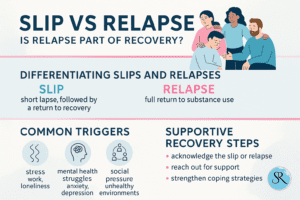Recovery isn’t always linear. Explore the difference between slips and relapses, and learn how to turn setbacks into stepping stones toward lasting sobriety.

Recovery Is a Journey, Not a Straight Line
If you’ve ever been in recovery—or loved someone who has—you know the path isn’t paved with perfection. It’s winding, unpredictable, and sometimes downright messy. One moment you’re riding a wave of progress, the next you’re battling old urges you thought were behind you.
This doesn’t mean failure. It means you’re human.
The addiction recovery process is a long-term commitment that often includes detours. The real progress isn’t measured by never slipping—it’s measured by how you respond when you do. In this blog, we’ll unpack the difference between a slip and a relapse, how to recover from setbacks, and how to build a more resilient future.
What Is a Slip? Identifying Minor Setbacks
Let’s start with a gentle truth: a slip can happen. And it doesn’t have to mean you’ve thrown everything away.
A slip is typically defined as a brief, one-time return to substance use. Think of it as a momentary lapse—often driven by high emotion, stress, or an unexpected trigger—not a full return to an old lifestyle. It’s not planned. It’s reactive. And most importantly, it’s recoverable.
Slips become dangerous when they’re met with silence, shame, or avoidance. The key is not ignoring them—it’s using them as signals that something in your support system or coping strategy might need strengthening.
What Is a Relapse? When a Slip Becomes More Serious
In contrast, a relapse refers to a return to consistent, sustained substance use after a period of abstinence. Unlike a slip, relapse often involves a breakdown of routines, support systems, and accountability structures.
Common signs that a slip is becoming a relapse:
- Returning to using multiple days in a row
- Avoiding therapy or recovery meetings
- Justifying or hiding substance use
- Reconnecting with unhealthy environments or people
- Abandoning coping strategies or routines
While relapses are more serious than slips, they’re not impossible to come back from. With the right tools and support, even a relapse can become a turning point in someone’s story.
The Psychological Impact of Slips and Relapses
The aftermath of a setback often hits harder than the moment itself. People in recovery frequently describe an avalanche of shame, guilt, and frustration—especially when they’ve been doing well for a long time.
These feelings can be paralyzing. But they don’t have to be permanent.
Here’s what to remember if you’ve experienced a setback:
- You’re not a failure—you’re learning.
- Your past progress still counts.
- Feeling overwhelmed is normal.
- Asking for help is a strength, not a weakness.
The emotional impact of relapse isn’t just personal—it’s neurological. Addiction rewires the brain, and recovery requires unlearning those patterns. That takes time, practice, and patience with yourself.
Is Relapse Part of Recovery? A New Perspective
It might sound counterintuitive, but many addiction professionals agree: relapse can be part of recovery.
Here’s why.
Recovery is not a destination—it’s a process of ongoing self-discovery. A relapse doesn’t erase the work you’ve done. Instead, it can:
- Reveal hidden triggers or unmet needs
- Strengthen your commitment to sobriety
- Encourage deeper honesty and vulnerability
- Push you toward more effective support systems
Relapses aren’t required, but they’re not disqualifying either. What matters most is how you respond—and how willing you are to keep going.
Common Triggers That Lead to Slips and Relapses
Understanding your triggers is a major step toward prevention. These aren’t just external situations—they’re internal emotional states that leave you vulnerable to old habits.
Top relapse and slip triggers include:
- Stress: Work, finances, or unresolved trauma
- Loneliness: Lack of connection or community support
- Complacency: Letting routines or accountability slip
- Social pressure: Being around environments tied to substance use
- Mental health: Unmanaged anxiety, depression, or PTSD
You can’t eliminate every trigger—but you can prepare for them. Recovery is about learning to respond differently when those moments come.
How to Recover After a Setback
The first thing to do after a slip or relapse? Tell someone.
Silence gives shame room to grow. But speaking up opens the door to recovery.
Here are a few ways to bounce back:
- Reach out to a therapist or recovery coach
- Re-engage with your recovery community or support group
- Recommit to your recovery routines—therapy, journaling, mindfulness
- Reflect without judgment: What led to the slip? What can change?
- Rebuild your support system with people who get it and want you well
Slips and relapses don’t mean you’re starting from zero. They mean it’s time to re-align and recommit.
Preventing Relapse: Building Resilience
Long-term recovery isn’t about willpower—it’s about structure. Staying sober requires intentional practices that protect your progress and support your emotional well-being.
Resilience-building habits to reduce relapse risk:
- Mindfulness practices like meditation or grounding exercises
- Daily structure with routines around sleep, nutrition, and movement
- Therapy or coaching to address triggers and emotional patterns
- Healthy social circles with people who respect your sobriety
- Sober living resources that provide accountability and community
Think of these tools as your armor. You don’t need to be perfect—but you do need to stay protected.
How Skypoint Recovery Supports Your Journey
At Skypoint Recovery in Akron, we understand that the road to sobriety has twists and turns. We’ve walked alongside people through relapses, rebuilds, and redemptions—and we’re still here, walking with them.
Whether you’re currently experiencing a setback or simply want to strengthen your recovery, our team helps you find the right program, whether it’s:
- A Partial Hospitalization Program (PHP) to re-center and stabilize
- An Intensive Outpatient Program (IOP) that fits around work or family life
- Access to sober living resources that offer structure and support
We’ll help you build a personalized recovery plan that fits your life and honors your journey. And yes—we accept Medicaid Insurance, and we’ll work with you to figure out any financial options you may need.
Learn to get back up.
Take Control Today: Your Next Step in Recovery
Relapse is not the end of your story—it’s a chapter. And the next one is still unwritten.
If you’re ready to rebuild, reconnect, or simply talk about what’s next, Skypoint Recovery is here to help. We offer compassionate, customized care that meets you where you are—and helps you move forward.
Call us today at 330-964-3407 or fill out our online form to talk with someone who understands what you’re going through.
Related Blogs
-
High‑Functioning but Still Struggling with Substance Use? How to Spot a Problem When Life Looks ‘Fine’ on the Outside
-
Do I Really Have a Substance Misuse Problem? Early Warning Signs You Shouldn’t Ignore
-
Building Coping Skills: Replacing Trauma-Driven Substance Use with Healthy Strategies
-
Evidence-Based Therapies for Treating Trauma and Addiction Together
-
Trauma-Informed Care in Addiction Treatment: What It Looks Like in Practice


Freedom Is Just a Call Away
Skypoint Recovery offers personalized treatment programs led by experienced professionals who understand your journey. We’ll help you build the foundation for lasting recovery through evidence-based care tailored to your needs. Your path to healing awaits – reach out for a confidential consultation.









